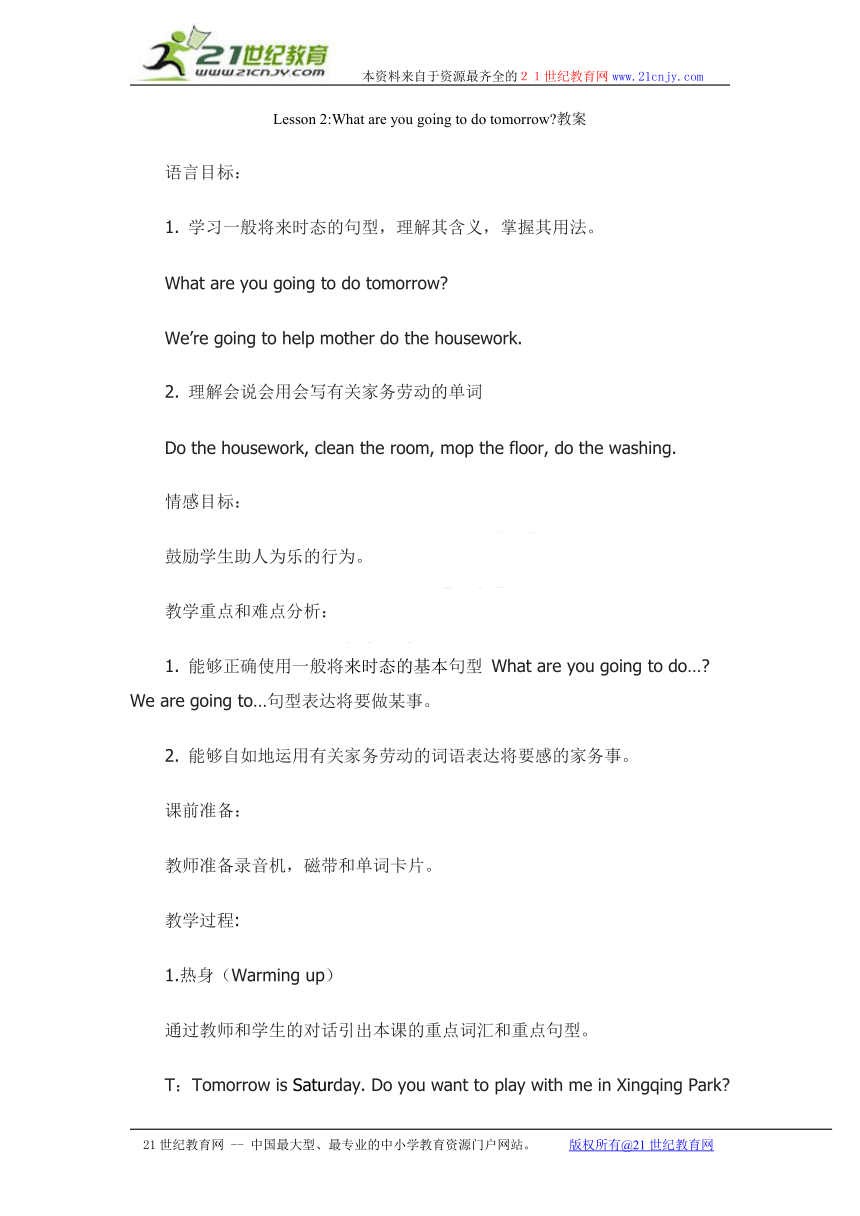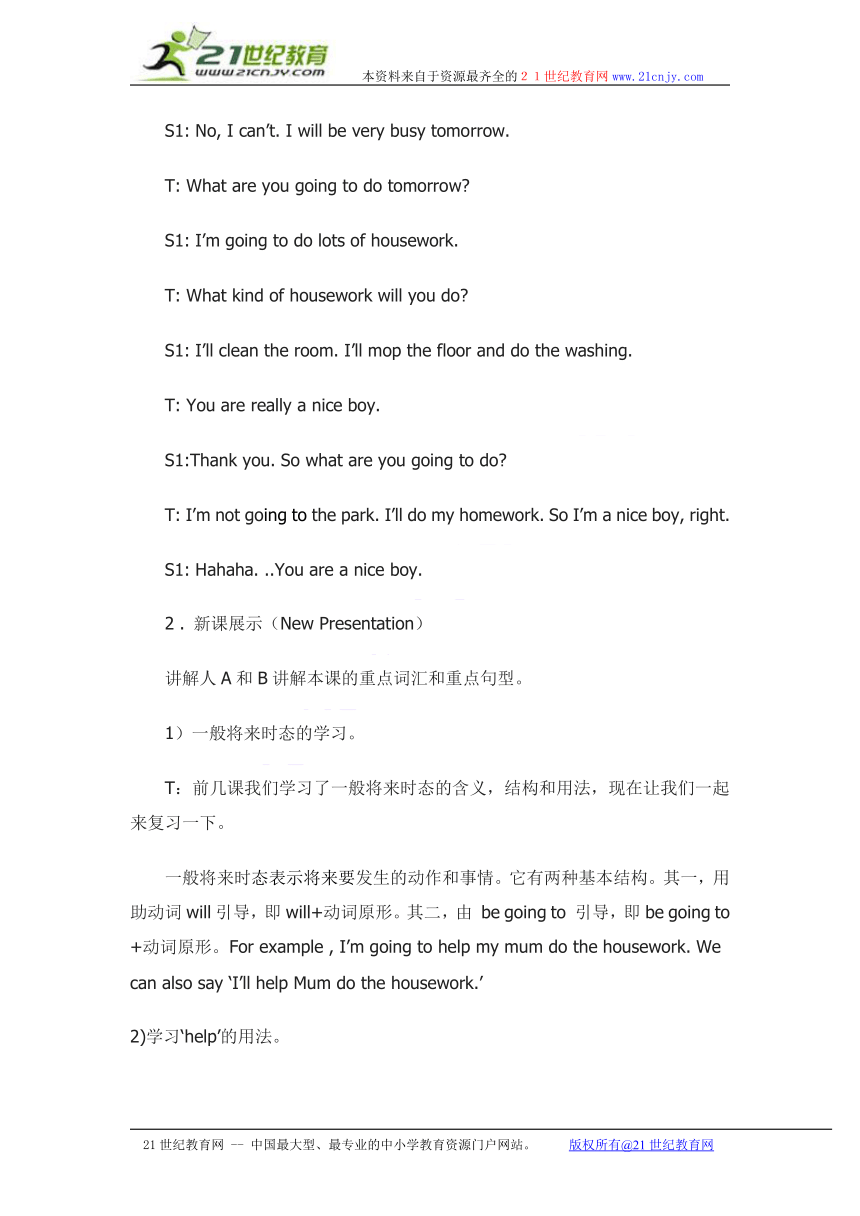六年级英语Lesson 2:What are you going to do tomorrow教案(科普版)
文档属性
| 名称 | 六年级英语Lesson 2:What are you going to do tomorrow教案(科普版) |

|
|
| 格式 | zip | ||
| 文件大小 | 11.4KB | ||
| 资源类型 | 教案 | ||
| 版本资源 | 科普版 | ||
| 科目 | 英语 | ||
| 更新时间 | 2015-12-31 00:00:00 | ||
图片预览


文档简介
本资料来自于资源最齐全的21世纪教育网www.21cnjy.com
Lesson 2:What are you going to do tomorrow 教案
语言目标:
1. 学习一般将来时态的句型,理解其含义,掌握其用法。
What are you going to do tomorrow
We’re going to help mother do the housework.
2. 理解会说会用会写有关家务劳动的单词
Do the housework, clean the room, mop the floor, do the washing.
情感目标:
鼓励学生助人为乐的行为。
教学重点和难点分析:
1. 能够正确使用一般将来时态的基本句型 What are you going to do… We are going to…句型表达将要做某事。21世纪教育网版权所有
2. 能够自如地运用有关家务劳动的词语表达将要感的家务事。
课前准备:
教师准备录音机,磁带和单词卡片。
教学过程:
1.热身(Warming up)
通过教师和学生的对话引出本课的重点词汇和重点句型。
T:Tomorrow is Saturday. Do you want to play with me in Xingqing Park
S1: No, I can’t. I will be very busy tomorrow.
T: What are you going to do tomorrow
S1: I’m going to do lots of housework.
T: What kind of housework will you do
S1: I’ll clean the room. I’ll mop the floor and do the washing.
T: You are really a nice boy.
S1:Thank you. So what are you going to do
T: I’m not going to the park. I’ll do my homework. So I’m a nice boy, right.
S1: Hahaha. ..You are a nice boy.
2 . 新课展示(New Presentation)
讲解人A和B讲解本课的重点词汇和重点句型。
1)一般将来时态的学习。
T:前几课我们学习了一般将来时态的含义,结构和用法,现在让我们一起来复习一下。
一般将来时态表示将来要发生的动作和事情。它有两种基本结构。其一,用助动词will引导,即will+动词原形。其二,由 be going to 引导,即be going to +动词原形。For example , I’m going to help my mum do the housework. We can also say ‘I’ll help Mum do the housework.’21教育网
2)学习‘help’的用法。
T: Here we have a phrase----‘help …do…’(出示短语意思帮助某人做某事) For example,21cnjy.com
(出示小女孩帮助老爷爷过马路的图片) --- help the Grandpa cross the street【来源:21·世纪·教育·网】
(出示小女孩帮助奶奶做家务的图片)---help the grandma do the housework21·世纪*教育网
3) 学习有关家务学习的短语。
教师出示做家务的图片----do the housework. We still have some other phrases.www-2-1-cnjy-com
(出示洗衣服的图片) ------ do the washing
(出示打扫房间的图片) ----- clean the room
( 出示拖地的图片) -------mop the floor
A: 上节课我们学习了一个情态动词---may, 它表示委婉请求的含义。今天我们还要学习一个情态动词---shall, 它有商议的含义。www.21-cn-jy.com
B: For example, (出示句型)
When shall we meet (我们应该在什么时间相见呢?)
3.小结:
本节课我们系统地学习了一般将来时态,并且学习了情态动词‘shall’的用法。
4.巩固活动:
1)教师邀请一个学生到讲台前给其他同学做动作。其他同学说出短语名称,复习完了,两人一组,互问互答,2·1·c·n·j·y
S1: What are you going to do tomorrow
S2: I’m going to read a book.
S1: What are you going to do tomorrow
S2: I’m going to go to school.
2)听录音学习对话。 Listen to the dialogue and then answer the questions.
A: What is Zhang Li going to do tomorrow
B: She’s going to heip Grandma Li do the housework.21·cn·jy·com
A: What will she do
B: She will clean the room and mop the floor.
A: When and where will they meet
B: They will meet at 8 o’clock outside the schoolgate.2-1-c-n-j-y
3)Do the exercise of Let’s practise (1)
A:这道题我们要掌握help…do…这个固定搭配的用法。
1. A: What are you going to do tomorrow
B: I’m going to help Grandma clean the room.
2. A: What are you going to do tomorrow
B: I’m going to help Grandma do the washing.
3. A: What are yougoing to do tomorrow
B: I’m going to help Grandma mop thefloor.
21世纪教育网 -- 中国最大型、最专业的中小学教育资源门户网站。 版权所有@21世纪教育网
Lesson 2:What are you going to do tomorrow 教案
语言目标:
1. 学习一般将来时态的句型,理解其含义,掌握其用法。
What are you going to do tomorrow
We’re going to help mother do the housework.
2. 理解会说会用会写有关家务劳动的单词
Do the housework, clean the room, mop the floor, do the washing.
情感目标:
鼓励学生助人为乐的行为。
教学重点和难点分析:
1. 能够正确使用一般将来时态的基本句型 What are you going to do… We are going to…句型表达将要做某事。21世纪教育网版权所有
2. 能够自如地运用有关家务劳动的词语表达将要感的家务事。
课前准备:
教师准备录音机,磁带和单词卡片。
教学过程:
1.热身(Warming up)
通过教师和学生的对话引出本课的重点词汇和重点句型。
T:Tomorrow is Saturday. Do you want to play with me in Xingqing Park
S1: No, I can’t. I will be very busy tomorrow.
T: What are you going to do tomorrow
S1: I’m going to do lots of housework.
T: What kind of housework will you do
S1: I’ll clean the room. I’ll mop the floor and do the washing.
T: You are really a nice boy.
S1:Thank you. So what are you going to do
T: I’m not going to the park. I’ll do my homework. So I’m a nice boy, right.
S1: Hahaha. ..You are a nice boy.
2 . 新课展示(New Presentation)
讲解人A和B讲解本课的重点词汇和重点句型。
1)一般将来时态的学习。
T:前几课我们学习了一般将来时态的含义,结构和用法,现在让我们一起来复习一下。
一般将来时态表示将来要发生的动作和事情。它有两种基本结构。其一,用助动词will引导,即will+动词原形。其二,由 be going to 引导,即be going to +动词原形。For example , I’m going to help my mum do the housework. We can also say ‘I’ll help Mum do the housework.’21教育网
2)学习‘help’的用法。
T: Here we have a phrase----‘help …do…’(出示短语意思帮助某人做某事) For example,21cnjy.com
(出示小女孩帮助老爷爷过马路的图片) --- help the Grandpa cross the street【来源:21·世纪·教育·网】
(出示小女孩帮助奶奶做家务的图片)---help the grandma do the housework21·世纪*教育网
3) 学习有关家务学习的短语。
教师出示做家务的图片----do the housework. We still have some other phrases.www-2-1-cnjy-com
(出示洗衣服的图片) ------ do the washing
(出示打扫房间的图片) ----- clean the room
( 出示拖地的图片) -------mop the floor
A: 上节课我们学习了一个情态动词---may, 它表示委婉请求的含义。今天我们还要学习一个情态动词---shall, 它有商议的含义。www.21-cn-jy.com
B: For example, (出示句型)
When shall we meet (我们应该在什么时间相见呢?)
3.小结:
本节课我们系统地学习了一般将来时态,并且学习了情态动词‘shall’的用法。
4.巩固活动:
1)教师邀请一个学生到讲台前给其他同学做动作。其他同学说出短语名称,复习完了,两人一组,互问互答,2·1·c·n·j·y
S1: What are you going to do tomorrow
S2: I’m going to read a book.
S1: What are you going to do tomorrow
S2: I’m going to go to school.
2)听录音学习对话。 Listen to the dialogue and then answer the questions.
A: What is Zhang Li going to do tomorrow
B: She’s going to heip Grandma Li do the housework.21·cn·jy·com
A: What will she do
B: She will clean the room and mop the floor.
A: When and where will they meet
B: They will meet at 8 o’clock outside the schoolgate.2-1-c-n-j-y
3)Do the exercise of Let’s practise (1)
A:这道题我们要掌握help…do…这个固定搭配的用法。
1. A: What are you going to do tomorrow
B: I’m going to help Grandma clean the room.
2. A: What are you going to do tomorrow
B: I’m going to help Grandma do the washing.
3. A: What are yougoing to do tomorrow
B: I’m going to help Grandma mop thefloor.
21世纪教育网 -- 中国最大型、最专业的中小学教育资源门户网站。 版权所有@21世纪教育网
同课章节目录
- Lesson 1:Are you going to have a birthday party?
- Lesson 2:What are you going to do tomorrow?
- Lesson 3:It will be sunny this Sunday
- Lesson 4:What kind of books will you buy?
- Lesson 5:Revision
- Lesson 6:It's on the fifth floo
- Lesson 7:What's the date today?
- Lesson 8:Merry Christmas!
- Lesson 9:Were you at school yesterday?
- Lesson 10:Revision
